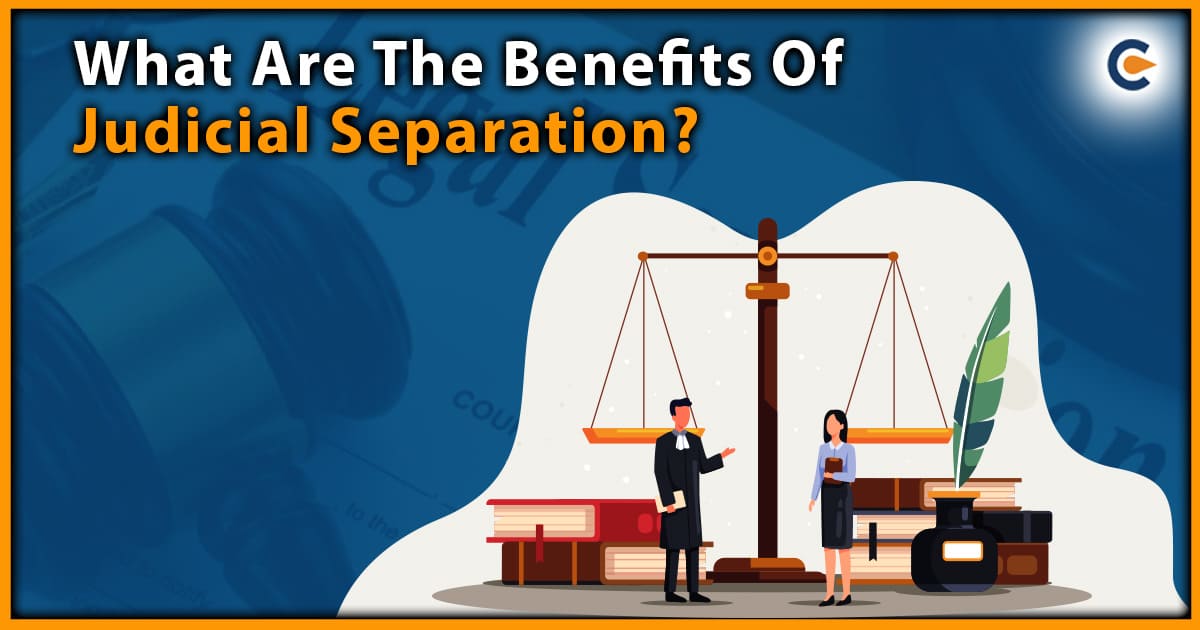According to the law, judicial separation is a way to offer some time for introspection to both partners in a disturbed marriage. The law encourages husbands and wives to live apart while also giving them the opportunity to reconsider the period of their relationship. It is the final option available to both spouses for the formal dissolution of the marriage, giving them the freedom and independence to consider what happens next.
What is Judicial Separation?
It is a legal process that allows a married couple to live separately without formally ending their marriage. Between marriage and divorce, it is a stepping stone. Contrary to a divorce, a legal separation permits the couple to live apart and lead different lives without destroying the marriage’s ties.
The couple may petition the court for Several issues, including child custody, alimony, and property distribution, during the period of the legal separation process. The couple will be legally separated if the court approves the judicial separation, and they will have to follow the court’s rules. A judicial separation decree does not end a marriage. The couple is still legally wed and has the option to get back together and start over at any time. They must submit a separate divorce petition if they decide to divorce later.
In general, the concept of judicial separation in Hindu law gives married couples a way to secure a divorce who are unable to cohabitate, while still being legally wed.
In the case of Narasimha Reddy v. M. Boosamma, the court found that the couple’s marital status had not ended with the entry of the judicial separation decision.
Benefits of Judicial Separation
- Time to Reflect and address issues: A judicial separation gives couples some space to consider their relationship and decide whether to stay married or break it up. It is a less harsh option than divorce and gives the pair some time to consider their choice before making a final decision.
- Legal Rights: Through judicial separation, spouses are still able to exercise their legal rights as husband and wife. They might continue to inherit from one another or file joint taxes, for instance. Couples who wish to separate but do not want to annul their marriage can benefit from this.
- No Need for Divorce: If the couple gets back together while they’re apart, they can end the separation and carry on with their marriage without having to get a divorce.
- Protection of Rights: Spouses who have experienced violence or cruelty from their partners may be able to get judicial separation to give them legal protection. Orders for maintenance and the defense of their property rights may be included.
- Child Custody: If the couple has children, a judicial separation can also help determine the terms of child support and custody.
- Religious or Cultural views: Due to religious or cultural views that prohibit divorce, some couples may choose legal separation over divorce. In these situations, judicial separation offers a legitimate choice for separation while upholding the honor of marriage.
- Benefits to health: Separating from a partner who may be a source of stress or anxiety can be good for health and allow people to concentrate on their physical and mental well-being.
- Reconciliation: Legal separation provides the parties with the opportunity to live separately while they reevaluate their marriage and consider their options for getting back together. Contrarily, divorce terminates the marriage, and it’s possible that after it’s finalized, the parties won’t be able to get back together
- Financial considerations: Divorce may occasionally be an expensive procedure, particularly if the parties are fighting a long-running legal dispute. Since couples can live apart while maintaining some of the financial advantages of marriage, judicial separation may be a less expensive option.
Maintenance under Judicial Separation
According to the Hindu Marriage Act of 1955[1], the court has the authority to order one spouse to support the other spouse during a legal separation. The court will take into account the standard of living the couple had before their divorce in addition to other factors like each spouse’s income and earning potential, assets, and other financial resources.
Support for the spouse and/or children of the marriage may be given in the form of maintenance. The court may decide on a set amount or a percentage of the paying spouse’s income as the maintenance payment. The court may also establish the duration of maintenance payments.
In the case of Sohan Lal v. Kamlesh, it was decided that if the woman is unable to support herself after the court has issued a decree of judicial separation, the husband may be required to provide maintenance to her.
Conclusion
Judicial separation is better than divorce since it gives the couple an opportunity to overturn the decision and cohabit once more after some time apart. This is because there is no formal end to the marriage under judicial separation, unlike in the case of divorce. This law gives the husband and wife the opportunity to decide whether to stay together or be ordered to live separately, giving them the much-needed space and independence to make their own decisions. A it is a legal tool designed to give both parties some time for introspection in a troubled marriage. The goal of judicial separation is to safeguard the interests of any children from marriage and give both partners the chance to work towards reconciliation.
Read Our Article: What Is The Difference Between Judicial Separation And Divorce?











